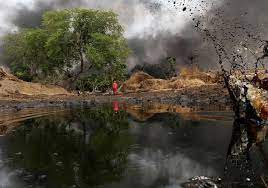Nathan Tamarapeye, Yenagoa
The regulatory agencies investigating the Nov 5 oil spill at Oil Mining Lease (OML) 29 at Nembe Bayelsa have attributed the incident which polluted the Santa Barbra River and Nembe creeks to sabotage.
This position stirred controversy as parties held divergent views as no consensus was reached by the joint investigative team after Wednesday’s trip to the ill-fated oil well located at the bank of Santa Barbra River at Nembe.
The Joint Investigative Visit (JIV) to ascertain the cause, volume and impacted areas resumed on Wednesday following a visit by Minister of State for Environment Mrs Sharon Ikeazor a day earlier.
The JIV is a statutory probe that follows every reported leak incident.
The JIV, usually convened by the operator of the leak facility is comprised of representatives of the oil firm, affected communities, regulators, and the state ministry of environment.
Speaking after the JIV on Thursday, representatives of the National Oil Spills Detection and Response Agency (NOSDRA) and the Nigerian Upstream Petroleum Regulatory Commission (NUPRC) traced the leak to sabotage.
Mr Ismail Baba-Ahmed, a representative of NOSDRA on the JIV said that from his expertise on fluid mechanics and his interactions with the well head experts who plugged the leak, only vandalism could have caused the spill.
He further explained that he gathered from the well head engineers that the threading on the well head casing where the valve was removed was not worn out, a development that suggests that the leak was not caused by pressure.
Also, Mr Adetoyibo Adeyemi of NUPRC agreed with the position of NOSDRA adding that physical examination of the failed well head from an engineering point of view indicate that the pressure from the oil well was not sufficient to blow the well.
However, the representatives of the impacted communities, Bayelsa Ministry of Environment and Bayelsa Technical Committee on the oil spill subsequently declined to sign the JIV report and made the exercise inconclusive.
Mr Enai Reuben, Head of Pollution Control, Bayelsa Ministry of Environment noted that the JIV team was not able to see the exact point of leak for physical examination and hence could not ascertain the cause.
He said that he had reservations over the procedure of scheduling the JIV after the operator had tampered and fixed the missing valves that would have been scrutinised by the JIV team.
According to him, it would be inaccurate to draw conclusion without seeing the leak point in an investigation that is evidence based and wondered why the well head could not be preserved for evaluation after the leak was stopped.
It would be recalled that the leak which was reported on Nov 5 was plugged on Dec 8 and some 16,280 barrels of crude and crude sediments have so far been recovered from the incident site.
Aiteo had in 2015 acquired OML 29 for about $2.4 billion following Shell’s gradual divestment policy from onshore assets
The asset consists of the 97km Nembe Creek Trunk Line which evacuates crude from onshore oil wells within the oil bloc and other operators to Bonny Export Terminal.

